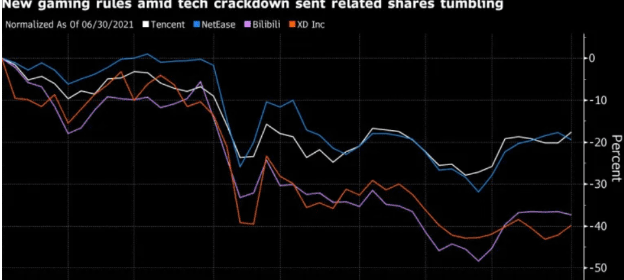China’s Strict Video Game Regulations: How They Affect The US

Christopher Fisher, Staff Reporter
China is notorious when it comes to policies and regulations within their country. One of those policies include their regulations concerning video games.
These policies date back to the early 2000s when they had a console ban still lasting to present day.
August 30th, 2021 is the day the Chinese released new regulations to their country. Any player under the age of eighteen can only play 3 hours a week; Anymore than that is illegal. To be more specific, they’re limited to 1 hour a day over the course of Fridays, Saturdays, and Sundays.
The government doesn’t make parents enforce these rules, they make the gaming companies themselves enforce the new rules, requiring them to limit any young player’s gaming time.
According to Towson, “ In 2007, around 14 percent of Chinese adolescent internet users—about 10 million teenagers—met the diagnostic criteria for internet addiction. According to the China Internet Network Information Center, this number increased 16 percent by 2018, with over 30 percent of minors suffering from gaming disorders.”
As a result of gaming addiction, these rules were erected. Although personally I think the new regulations are absurd.
If these players are so attached to their game, getting rid of their playtime is bound to also have its negative effects, such as withdrawals and negative behavior. Instead, I believe their playtime should be limited, however not as much as it is currently. I think 2 hours minimum a day would be enough to satisfy the players.
Why do their regulations also affect the US and other countries and not just China? It’s because the games produced in China are directly altered and adjusted to fit Chinese guidelines and regulations.
Firstly, games produced in China have a large player base consisting of Chinese players. When these Chinese servers lose a large quantity of their players, it doesn’t look good for the companies. As a result, these policies negatively impact the player-base, causing a decrease in play time as well as revenue.

Image provided by bloomberg
As heavily decreased player time and funding continues, it negatively affects the gaming market. When the big companies start losing their income, they’re going to find a different way to keep their paychecks coming.
Whether it be moving on to a new game or changing where their game is produced, it’s the scary reality that changes the game for the better or for the worse.
Another concerning alteration that comes with the strict guidelines is censorship. China dislikes anything beyond PG-13.
Censorship includes no realistic blood, cleavage or over exposed bodies, and exposed bones on bodies. Not only that, anything that risks affecting social morality, cultural traditions, and cult-like behavior is prohibited.
With these restrictions, the developers of games need to work around these rules and somehow make a game as realistic and visually pleasing as possible. All these constraints take away from the games’ immersion.
An example of this censorship can be found within League of Legends where certain characters have red-colored blood and had to be changed to black. Another example includes Genshin Impact where certain characters get a remodel since they showed too much skin.
It’s fine if the censorship happens only in China, however, if it ever makes it to the US, that’s when it becomes a problem. Luckily in cases like Genshin Impact, the character redesigns only affect the Chinese and are optional to US players.
Although, when does China’s censorship stop? There are more characters within Genshin and are bound to receive a redesign because of their appearance not being up to regulation and code. There’s already censorship for certain camera angles within the game. I’m afraid they’ll censor the entire game within the next few updates.
If China’s regulations on video games become more restrictive in the future, games based in China may drastically change and lose the player base not only in China, but in other countries as well.

